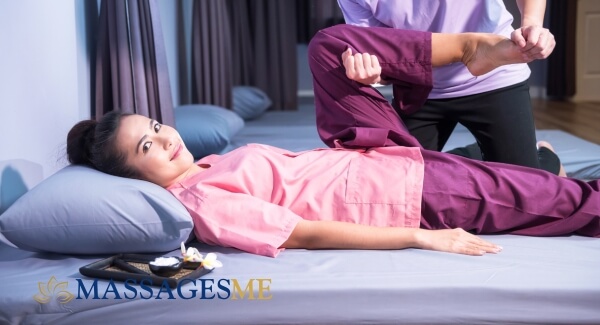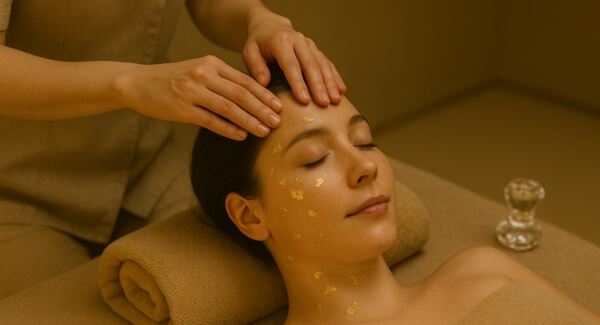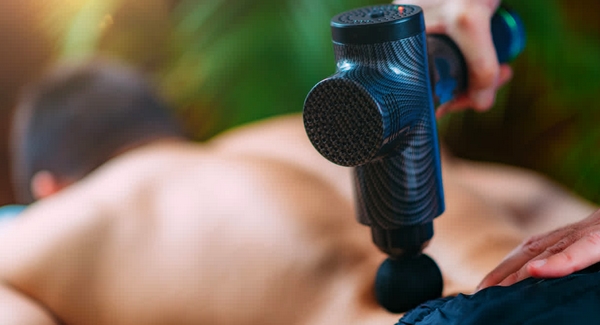The Mental and Emotional Benefits of a Thai Massage Session

In our modern world, stress and anxiety have become near-universal experiences. The pressures of work, relationships, financial concerns, and the relentless pace of daily life create a constant state of tension that affects both body and mind. Whilst many people seek relief through medication, therapy, or lifestyle changes, an ancient healing practice offers a profoundly effective complementary approach: Thai massage.
Unlike treatments that address only physical symptoms or purely psychological interventions, Thai massage works holistically, recognising the inseparable connection between bodily tension and mental distress. Through a unique combination of rhythmic pressure, assisted stretching, mindful breathing, and energy work, Thai massage creates physiological and psychological shifts that directly counteract the effects of chronic stress and anxiety.
This article explores the mental and emotional benefits of Thai massage, examining the scientific evidence for its stress-relieving effects, explaining the mechanisms through which it calms the nervous system and elevates mood, and providing practical guidance for incorporating this therapeutic practice into a comprehensive approach to mental wellness.
Understanding Stress and Anxiety: The Modern Epidemic
Before exploring how Thai massage addresses these conditions, it's helpful to understand what stress and anxiety are and how they manifest in the body and mind.
Stress represents the body's response to demands or threats. When faced with challenges, the sympathetic nervous system activates the "fight or flight" response, releasing stress hormones such as cortisol and adrenaline, which increase heart rate, tense muscles, and sharpen focus. This response evolved to help humans survive immediate physical dangers, but modern stressors rarely require such dramatic physiological reactions.
The problem arises when stress becomes chronic. Constant activation of stress responses without adequate recovery periods leads to elevated cortisol levels, persistent muscle tension, disrupted sleep, weakened immunity, digestive problems, and numerous other health issues.
Anxiety extends beyond normal stress responses. It involves persistent worry, fear, or apprehension that feels difficult to control and may lack a specific cause. Physical symptoms include muscle tension, rapid heartbeat, shallow breathing, restlessness, and fatigue. Anxiety can range from mild unease to debilitating panic, significantly impacting quality of life.
Both conditions create a vicious cycle: mental distress causes physical tension, which reinforces psychological symptoms, which intensifies bodily discomfort. Breaking this cycle requires interventions that address both dimensions simultaneously, making Thai massage's holistic approach particularly valuable.
The Holistic Framework: How Thai Massage Addresses Stress and Anxiety
Thai massage doesn't simply treat symptoms; it addresses the fundamental imbalances that perpetuate stress and anxiety. Several core principles make it uniquely effective for mental and emotional well-being.
Parasympathetic Nervous System Activation
The autonomic nervous system has two branches: the sympathetic system (fight or flight) and the parasympathetic system (rest and digest). Chronic stress keeps the sympathetic system dominant, whilst mental health requires regular activation of the parasympathetic system for recovery and restoration.
Thai massage actively stimulates parasympathetic activity through multiple mechanisms:
Rhythmic, predictable touch: The slow, steady pressure and movements signal safety to the nervous system. When the body perceives safety, the parasympathetic system naturally activates.
Deep pressure: Sustained pressure on muscles and Sen lines triggers relaxation responses at both local and systemic levels, shifting the nervous system toward rest mode.
Breathing coordination: The practice's emphasis on slow, deep breathing directly activates the vagus nerve, the primary parasympathetic pathway, promoting calm and reducing stress hormone production.
This parasympathetic activation produces measurable physiological changes: lowered heart rate, reduced blood pressure, decreased cortisol levels, improved digestion, and enhanced immune function. These changes create the bodily conditions for mental calm and emotional equilibrium.
Releasing Physical Tension Patterns
Stress and anxiety don't exist purely as mental phenomena; they manifest physically as chronic muscle tension, particularly in areas like the neck, shoulders, jaw, and lower back. This tension becomes self-perpetuating: tight muscles send distress signals to the brain, which interprets these signals as evidence of an ongoing threat, maintaining the stress response.
Thai massage systematically addresses these tension patterns through:
Targeted pressure along Sen lines: Working these energy pathways releases deeply held muscular contractions, particularly those associated with emotional holding patterns.
Assisted stretching: Gentle, sustained stretches lengthen chronically shortened muscles, creating space in the body and releasing the physical component of stress.
Joint mobilisation: Moving joints through their range of motion reduces stiffness and the discomfort that contributes to mental agitation.
As physical tension releases, the nervous system receives feedback that the threat has passed, allowing mental relaxation to follow. Many recipients describe feeling as though a weight has been lifted, both literally and metaphorically.
Mindfulness and Present-Moment Awareness
Anxiety often involves rumination about the past or worry about the future. Thai massage naturally cultivates mindfulness, anchoring awareness in present-moment bodily sensations.
The practice's slow, deliberate pace encourages recipients to focus on immediate experience: the sensation of stretch, the rhythm of breath, the feeling of hands applying pressure. This focused attention quiets the constant mental chatter that fuels anxiety, providing respite from worry and creating mental space for calm.
The meditative quality extends to both recipient and therapist. Practitioners trained in traditional methods approach each session as a moving meditation, maintaining focused presence throughout. This quality of attention creates a therapeutic container that supports deep relaxation and emotional release.
Energy Work and Emotional Balance
Traditional Thai medicine views emotional disturbances as manifestations of blocked or imbalanced energy flow along the Sen lines. Different Sen lines associate with particular emotional states and psychological functions:
Sen Kalathari, for example, strongly connects to emotional processing and heart function. Working this line addresses anxiety, emotional distress, and feelings of disconnection.
Other lines relate to different aspects of mental and emotional health. By clearing blockages and restoring balanced energy flow, Thai massage addresses the energetic dimension of psychological well-being that conventional approaches often overlook.
Whilst Western science doesn't yet fully explain these effects through the traditional energetic framework, many recipients report profound emotional shifts during and after sessions, suggesting that something significant occurs beyond purely mechanical tissue manipulation.
Scientific Evidence: What Research Reveals
Traditional wisdom has long recognised Thai massage's mental health benefits, but modern research increasingly validates these claims through controlled studies measuring objective physiological markers.
Key Research Findings
Stress biomarker reduction: A significant clinical study examined traditional Thai massage's effects on stress by measuring salivary alpha-amylase, a reliable biomarker that increases during stress. Results showed that Thai massage significantly reduced alpha-amylase levels, indicating a decrease in physiological stress. This finding provides objective evidence that Thai massage doesn't merely feel relaxing but produces measurable anti-stress effects at the biochemical level.
Heart rate variability improvements: The same research measured heart rate variability (HRV), which reflects autonomic nervous system balance. Higher HRV indicates better stress resilience and parasympathetic function. Thai massage significantly increased HRV, demonstrating enhanced nervous system regulation and improved capacity to manage stress.
Anxiety reduction: Multiple studies have documented decreased anxiety levels following Thai massage sessions. Participants report feeling calmer, less worried, and more emotionally balanced. These subjective improvements correspond with objective measures of reduced sympathetic nervous system activity.
Cortisol reduction: Research has shown that massage therapies, including Thai massage, can lower cortisol levels. Cortisol, often called the "stress hormone," contributes to numerous health problems when chronically elevated. Reducing cortisol through regular massage sessions helps break the physiological stress cycle.
Mood enhancement: Studies measuring mood states before and after Thai massage consistently show improvements in positive emotions and reductions in negative mood states. Recipients report feeling more content, peaceful, and emotionally stable.
Sleep quality improvements: Given the strong relationship between stress, anxiety, and sleep disturbance, research examining Thai massage's effects on sleep has found significant improvements. Better sleep, in turn, enhances emotional regulation and stress resilience, creating a positive feedback loop.
Mechanisms Confirmed by Research
Scientific investigations have identified several mechanisms through which Thai massage produces these mental health benefits:
- Increased parasympathetic dominance: Measurements of autonomic nervous system activity confirm that Thai massage shifts the balance toward parasympathetic activation, directly counteracting the chronic sympathetic dominance characteristic of stress and anxiety.
- Neurochemical changes: Whilst more research is needed, evidence suggests that massage stimulates endorphin and serotonin release whilst reducing cortisol. These neurochemical shifts create the biological foundation for improved mood and reduced anxiety.
- Reduced muscle tension: Objective measurements of muscle tension show significant reductions following Thai massage, correlating with participants' reports of feeling more relaxed and less stressed.
- Enhanced body awareness: Research indicates that massage therapies improve interoception (awareness of internal bodily states), which plays a crucial role in emotional regulation. Better body awareness helps people recognise and respond to stress signals before they escalate.
The Experience: What Happens During a Thai Massage Session
Understanding the mental health benefits theoretically is valuable, but experiencing them requires engaging with the practice itself. What actually happens during a Thai massage session that produces these effects?
The Setting and Atmosphere
Unlike clinical environments that may themselves trigger anxiety, Thai massage typically occurs in calm, welcoming spaces. Soft lighting, quiet surroundings, and the absence of medical equipment create an atmosphere of safety and relaxation. This environmental design supports the therapeutic process by reducing external stressors.
The Therapist-Client Relationship
The relationship between therapist and recipient plays a crucial role in the therapeutic effect. Skilled practitioners embody the principle of metta (loving-kindness), approaching each session with genuine care and compassionate intention. This quality of presence provides emotional support that extends beyond physical technique.
For people experiencing stress and anxiety, being received with such attention and care can itself be profoundly healing. In a world that often feels rushed and impersonal, an hour or more of focused, compassionate attention addresses the human need for connection and being valued.
The Physical Experience
Sessions unfold as a flowing sequence of techniques:
Initial grounding: Therapists often begin with gentle, rhythmic pressure and rocking motions that help recipients settle and begin releasing tension.
Systematic progression: Working through the body methodically (typically beginning with the legs and progressing upward) creates a sense of thoroughness and completeness. Nothing is rushed; each area receives appropriate attention.
Stretching sequences: Assisted stretches move the body through ranges of motion that feel both challenging and releasing. The experience of being guided into these positions requires trust and surrender, psychological states antithetical to anxiety's hypervigilance.
Deep pressure work: Focused pressure on Sen lines and tense areas releases held tension whilst the sustained contact provides a grounding, anchoring quality.
Breath awareness: Throughout, attention returns repeatedly to breathing, using breath as an anchor for present-moment awareness and a tool for facilitating release.
Common Emotional Responses
Many people experience unexpected emotional responses during Thai massage:
- Spontaneous relaxation: A sudden, profound letting go as the nervous system shifts from stress to rest mode
- Emotional release: Tears, laughter, or other emotional expressions as long-held tension releases (therapists trained in traditional methods recognise this as normal and therapeutic)
- Mental quieting: The constant mental chatter that characterises anxiety stops, creating unusual mental spaciousness
- Deep peace: A quality of calm that feels different from ordinary relaxation, sometimes described as meditative or spiritual
- Renewed energy: Despite the deep relaxation, many people feel revitalised rather than sedated, reflecting the practice's capacity to balance rather than merely sedate
These responses reflect genuine neurological and emotional shifts rather than placebo effects, as confirmed by the physiological measurements in research studies.
Long-Term Benefits: Building Emotional Resilience
Whilst a single Thai massage session provides immediate stress relief, regular practice builds lasting improvements in emotional well-being and stress resilience.
Cumulative Physiological Effects
Regular parasympathetic activation through repeated sessions trains the nervous system to shift more easily into rest mode. Over time, this creates:
- Lower baseline stress levels: The body's resting state becomes calmer, requiring less extreme activation to trigger stress responses
- Faster stress recovery: When stress occurs, the nervous system returns to baseline more quickly
- Improved stress tolerance: The same stressors that previously felt overwhelming become more manageable
- Better emotional regulation: The capacity to experience emotions without becoming overwhelmed by them improves
These changes reflect actual neurological adaptations, not merely temporary relief.
Behavioural and Psychological Changes
Beyond physiological effects, regular Thai massage often catalyses broader life changes:
- Increased body awareness: Growing sensitivity to tension patterns allows earlier intervention before stress accumulates
- Better self-care: The positive experience of receiving care often motivates improved self-care in other domains
- Enhanced mindfulness: The present-moment awareness cultivated during sessions often extends into daily life
- Improved boundaries: Learning to communicate about pressure preferences and comfort during massage can translate to better boundary-setting in relationships
- Greater self-compassion: Receiving regular compassionate attention from therapists can help people extend similar kindness to themselves
Integration with Other Wellness Practices
Thai massage works synergistically with other stress-management approaches:
Psychotherapy: Physical tension release can facilitate emotional processing in therapy; conversely, psychological work can help integrate the releases that occur during bodywork
Meditation: The mindfulness cultivated during massage supports meditation practice and vice versa
Exercise: Regular movement maintains the flexibility and stress relief gains from massage
Proper sleep: Improved sleep from massage enhances stress resilience; reduced stress improves sleep quality
Healthy nutrition: Lower stress levels often support better food choices; proper nutrition optimises the body's stress-response systems
Practical Guidance: Maximising Mental Health Benefits
To gain the greatest stress and anxiety relief from Thai massage, several practical considerations warrant attention.
Finding the Right Practitioner
The therapist's skill and intention significantly impact therapeutic outcomes, particularly for mental health benefits. Seek practitioners who:
- Have comprehensive training: At least 200 hours of instruction, preferably more, ensuring understanding of both technique and the underlying philosophy
- Understand the mind-body connection: Awareness that they're addressing mental and emotional health, not merely physical tension
- Embody compassionate presence: Genuine care and metta create the safe container necessary for deep relaxation and emotional release
- Communicate effectively: Willingness to discuss your stress and anxiety concerns and adapt treatment accordingly
For those in the UK seeking qualified therapists who understand Thai massage's mental health applications, you can find Thai massage practitioners in the UK with appropriate training and experience.
Session Frequency and Duration
Initial intensive phase: For significant stress or anxiety, weekly sessions for 4-6 weeks establish noticeable improvements
Maintenance schedule: Bi-weekly or monthly sessions sustain benefits once initial gains are achieved
Session length: 90-minute sessions allow sufficient time for the nervous system to shift into parasympathetic mode entirely; shorter sessions provide benefits but may feel rushed
Consistency: Regular, scheduled sessions work better than sporadic treatments, as cumulative effects build over time
Creating Optimal Conditions
Maximise benefits by:
- Arriving early: Allow time to transition from your busy day to the treatment space
- Communicating openly: Share your stress and anxiety concerns with your therapist so treatment can be tailored
- Minimising post-session demands: Avoid immediately rushing back to stressful activities; allow time to integrate the experience
- Staying hydrated: Proper hydration supports the body's processing of released tension and metabolic wastes
- Reflecting on the experience: Notice how you feel hours and days after treatment, learning what your body needs
Complementary Self-Care Practices
Between professional sessions, support stress relief through:
- Breathing practices: Simple techniques learned during massage can be used daily
- Gentle stretching: Basic yoga or stretching maintains physical suppleness
- Mindfulness meditation: Extends the present-moment awareness cultivated during massage
- Nature exposure: Time outdoors provides additional nervous system regulation
- Social connection: Meaningful relationships buffer against stress and anxiety
Special Considerations and Cautions
Whilst Thai massage offers significant mental health benefits, several considerations deserve attention.
When Professional Mental Health Care Is Needed
Thai massage complements but doesn't replace professional mental health treatment for clinical conditions. Seek appropriate care from qualified mental health professionals if you experience:
- Severe anxiety that significantly impairs daily function
- Panic attacks
- Depression, particularly with suicidal thoughts
- Trauma symptoms requiring specialised treatment
- Any mental health condition requiring medication management
Thai massage can be a valuable addition to professional treatment, but shouldn't substitute for necessary psychiatric or psychological care.
Emotional Release During Sessions
Some people experience unexpected emotional release during Thai massage as physical tension connected to emotional holding patterns is released. This is normal and therapeutic, but:
- Inform your therapist if you have a significant trauma history so they can provide appropriate support
- Understand that emotional release doesn't always occur, but is perfectly acceptable when it does
- Seek additional support from mental health professionals if emotional content feels overwhelming
Physical Conditions Affecting Suitability
Certain physical conditions require modified treatment or contraindicate Thai massage:
- Recent injuries or surgeries
- Acute inflammation
- Certain cardiovascular conditions
- Pregnancy (requires specially trained therapists)
- Some chronic health conditions
Always disclose health conditions to your therapist for appropriate modification.
Conclusion: Ancient Wisdom Meets Modern Stress
The mental and emotional benefits of Thai massage reflect a profound understanding of the mind-body connection that predates modern psychology by centuries. Traditional practitioners recognised that physical tension and energetic blockages manifested as emotional disturbance, and that addressing the body could heal the mind.
Contemporary research validates this wisdom, demonstrating measurable physiological changes that explain Thai massage's effectiveness for stress and anxiety relief. The practice activates the parasympathetic nervous system, reduces stress biomarkers, releases chronic muscle tension, and promotes neurochemical changes that support emotional well-being.
Yet Thai massage offers something that laboratory measurements cannot fully capture: the healing power of compassionate human connection, the transformation that occurs when someone receives sustained, mindful attention, and the profound peace that emerges when body, mind, and spirit are addressed as an integrated whole.
In our stress-saturated world, where anxiety has become normalised and mental health challenges affect unprecedented numbers of people, Thai massage provides an accessible, evidence-supported approach to building emotional resilience and reclaiming calm. It reminds us that healing need not always involve medication or purely cognitive interventions, that sometimes the path to mental peace runs through the body.
Whether you're managing chronic stress, addressing anxiety, or simply seeking greater emotional balance and well-being, Thai massage offers a time-tested, scientifically validated tool for nurturing mental health. The investment in regular sessions yields returns not only in reduced symptoms but also in an enhanced quality of life, greater emotional stability, and a renewed capacity to meet life's challenges with equanimity and grace.
Search Massage Therapists Near You.
More From Our Blog
Latest Blogs
UK Massage Industry Booming in 2026: 11% of UK Adults Now Use Massage Therapy (UK Report 2025)
Post-Thai Massage Care: Tips for Maximizing the Benefits After Your Session
Thai Massage for Beginners: Answering Common Questions for Your First Session
Choosing the Right Thai Massage Therapist: What to Look for in a Qualified Professional
Post-Thai Massage Care: Tips for Maximising the Benefits After Your Session
Preparing for Your Thai Massage: Tips on What to Wear and How to Get Ready
How to Talk to Your Therapist for the Best Thai Massage Experience
What to Expect During a Traditional Thai Massage Session
A Guide to How Thai Massage Techniques Can Correct Postural Issues
How Thai Massage Can Help with Back Pain, Headaches, and Sciatica
View All Blogs
Advertise with Massages Me and Grow Your Business!
We are the leading massage platform for massage therapists in London and across the UK covering all of England, Scotland, Wales and Northern Ireland. Our aim is to promote individual therapists and venues in the UK, and help professional and casual body workers providing therapeutic and relaxing massages to expand their businesses and build desirable client base.
We provide a friendly and reliable online advertising platform for qualified Masseuses, students, and salons to connect with potential clients looking for relaxing and therapeutic massages - onsite and offsite mobile services across the UK.
Are you looking to meet more customers? Get your profile listed and start getting bookings today!



